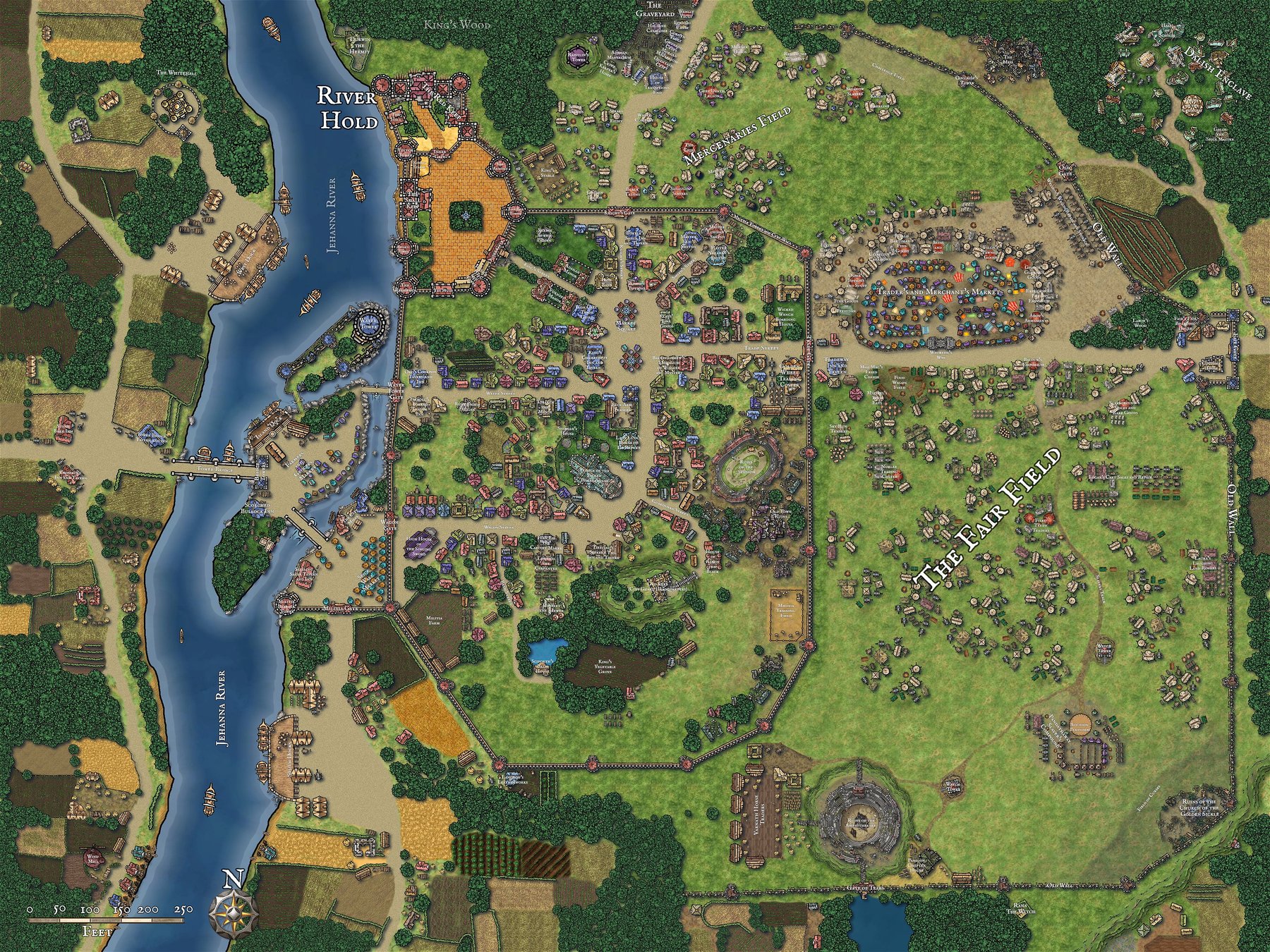
The City of Varnath is an ancient city. Sitting at the only location along the Jehanna River that is narrow enough to build bridges, it controls the water traffic that flows from the Great Jehanna Lake in the north to the Bay of Keys in the south. From East to West the Great Trade Way travels 10,000 miles from the Emerald Directorate to the Khovarian Imperium.
The City is known as a haven for merchants and adventurers. Anything can be found and purchased in the city, if enough time and coin is exchanged.
Seemingly unruly, disorganized and chaotic, the residents and travelers who pass through are surprisingly law abiding. The only thing that is viewed as truly forbidden is outright cheating, fraud and theft. The merchants self regulate these crimes using even handed and fair (but draconian) rules.
Kelsibor, 53rd of the Name, King of Varnath, Lord of the River, Overlord of the Iron Hills, a half drow magic knight is both beloved by the people who live in and respected by merchants who frequent the city. He and his knights are known to be fair, extremely loyal, incorruptible, and above all care deeply for the well being of the people who reside here.
Being an ancient city, the size and composition has ebbed and flowed through the centuries. Even the great dragons do not remember the founding. There has "always" been a settlement at the site. Great cities have risen and fallen. Small towns have survived. Great castles and temples have been buried with there secrets. If it has existed, it has existed at one time in the city.
The recently rebuild River Hold dominates the north of the city and houses the King and his court.
Several major temples exist in the City.
The Temple of the Sacred Pomegranate is dedicated to the Church of the Divine Host, with the primary shrines dedicated to Waukeen, Goddess of Trade, and Tymora, Goddess of Fortune (Luck). Major shrines to Amaunator, God of the Sun (locally known as Sol), Chauntea, Goddess of Agriculture, and Istishia, God of Water are located here. Finally, minor shrines to Azuth, God of Wizardry, Gond, God of Craft, Oghma, God of Knowledge, and Umberlee, Goddess of the Sea.
The High House of the Singing Sword is dedicated to the Church of the Ever Ready Hand. The primary shrines are dedicated to the Red Knight, Goddess of Strategy, Helm, God of Watchfulness, and Hoar, God of Revenge and Retribution. Major shrines exist to Bane, God of Tyranny, and Tyr, God of Justice. Minor shrines exist to Torm, God of Courage and Self Sacrifice, and Tempus, God of War.
On the North edge of the city is the House of Transitions End dedicated to the Church of Painful Solace. The primary shrines are dedicated to Kelemvor, God of the Dead, and Jergal, Scribe of the Dead. Major Shrines to Ilmatar, God of Endurance, and Loviatar, Goddess of Pain are here. Minor shrines to Lathander, God of the Dawn and Renewal, and Myrkul, God of Death are also here.
The House of the Ceaseless in the Dalish Enclave is dedicated to the Church of the Undying Court, the Elven Pantheon.
At the south end of the of the Fair Field, the Ruins of the Church of the Golden Sickle resides. The temple was destroyed by Kelsibor the Destructor, approximately 300 years ago and ultimately caused him to be overthrown and expelled from the city. It was a part of the Church of the Rising, and had primary, major and minor shrines dedicated to Asmodeus, God of Indulgence, Cyric, God of Lies, Denier, God of Writing, Selune, Goddess of the Moon, and Sune, Goddess of Love and Beauty.
The City is known for trade and so has multiple large and varied markets and many Inns and Taverns. There are surprisingly few crafters or merchants in the city walls as most items are imported and can be easily found and purchased in the various markets.
